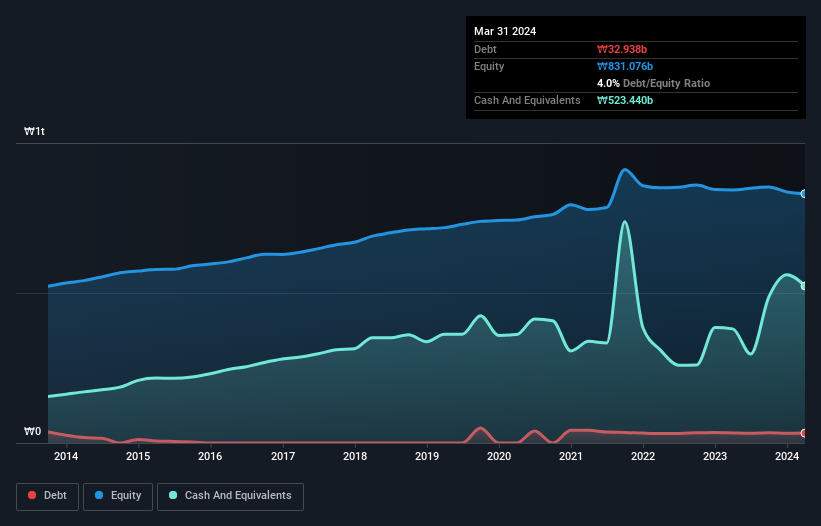
Warren Buffett famously said, 'Volatility is far from synonymous with risk.' So it might be obvious that you need to consider debt, when you think about how risky any given stock is, because too much debt can sink a company. We note that Hyundai Futurenet Co., Ltd. (KRX:126560) does have debt on its balance sheet. But the more important question is: how much risk is that debt creating?
When Is Debt Dangerous?
Debt and other liabilities become risky for a business when it cannot easily fulfill those obligations, either with free cash flow or by raising capital at an attractive price. Ultimately, if the company can't fulfill its legal obligations to repay debt, shareholders could walk away with nothing. While that is not too common, we often do see indebted companies permanently diluting shareholders because lenders force them to raise capital at a distressed price. Of course, debt can be an important tool in businesses, particularly capital heavy businesses. The first step when considering a company's debt levels is to consider its cash and debt together.
View our latest analysis for Hyundai Futurenet
What Is Hyundai Futurenet's Debt?
As you can see below, Hyundai Futurenet had ₩32.9b of debt, at March 2024, which is about the same as the year before. You can click the chart for greater detail. However, it does have ₩523.4b in cash offsetting this, leading to net cash of ₩490.5b.

How Healthy Is Hyundai Futurenet's Balance Sheet?
The latest balance sheet data shows that Hyundai Futurenet had liabilities of ₩70.9b due within a year, and liabilities of ₩7.23b falling due after that. Offsetting these obligations, it had cash of ₩523.4b as well as receivables valued at ₩25.3b due within 12 months. So it can boast ₩470.6b more liquid assets than total liabilities.
This surplus strongly suggests that Hyundai Futurenet has a rock-solid balance sheet (and the debt is of no concern whatsoever). On this view, lenders should feel as safe as the beloved of a black-belt karate master. Simply put, the fact that Hyundai Futurenet has more cash than debt is arguably a good indication that it can manage its debt safely.
The modesty of its debt load may become crucial for Hyundai Futurenet if management cannot prevent a repeat of the 70% cut to EBIT over the last year. Falling earnings (if the trend continues) could eventually make even modest debt quite risky. The balance sheet is clearly the area to focus on when you are analysing debt. But it is Hyundai Futurenet's earnings that will influence how the balance sheet holds up in the future. So if you're keen to discover more about its earnings, it might be worth checking out this graph of its long term earnings trend.
But our final consideration is also important, because a company cannot pay debt with paper profits; it needs cold hard cash. While Hyundai Futurenet has net cash on its balance sheet, it's still worth taking a look at its ability to convert earnings before interest and tax (EBIT) to free cash flow, to help us understand how quickly it is building (or eroding) that cash balance. Over the last three years, Hyundai Futurenet saw substantial negative free cash flow, in total. While that may be a result of expenditure for growth, it does make the debt far more risky.
Summing Up
While we empathize with investors who find debt concerning, the bottom line is that Hyundai Futurenet has net cash of ₩490.5b and plenty of liquid assets. So we don't have any problem with Hyundai Futurenet's use of debt. When analysing debt levels, the balance sheet is the obvious place to start. However, not all investment risk resides within the balance sheet - far from it. Be aware that Hyundai Futurenet is showing 2 warning signs in our investment analysis , you should know about...
If you're interested in investing in businesses that can grow profits without the burden of debt, then check out this free list of growing businesses that have net cash on the balance sheet.
Valuation is complex, but we're here to simplify it.
Discover if Hyundai Futurenet might be undervalued or overvalued with our detailed analysis, featuring fair value estimates, potential risks, dividends, insider trades, and its financial condition.
Access Free AnalysisHave feedback on this article? Concerned about the content? Get in touch with us directly. Alternatively, email editorial-team (at) simplywallst.com.
This article by Simply Wall St is general in nature. We provide commentary based on historical data and analyst forecasts only using an unbiased methodology and our articles are not intended to be financial advice. It does not constitute a recommendation to buy or sell any stock, and does not take account of your objectives, or your financial situation. We aim to bring you long-term focused analysis driven by fundamental data. Note that our analysis may not factor in the latest price-sensitive company announcements or qualitative material. Simply Wall St has no position in any stocks mentioned.
Have feedback on this article? Concerned about the content? Get in touch with us directly. Alternatively, email editorial-team@simplywallst.com
About KOSE:A126560
Hyundai Futurenet
Hyundai Futurenet Co., Ltd engages in the digital signage, immersive content, and corporate messaging businesses in South Korea.
Proven track record with adequate balance sheet.
Market Insights
Community Narratives



